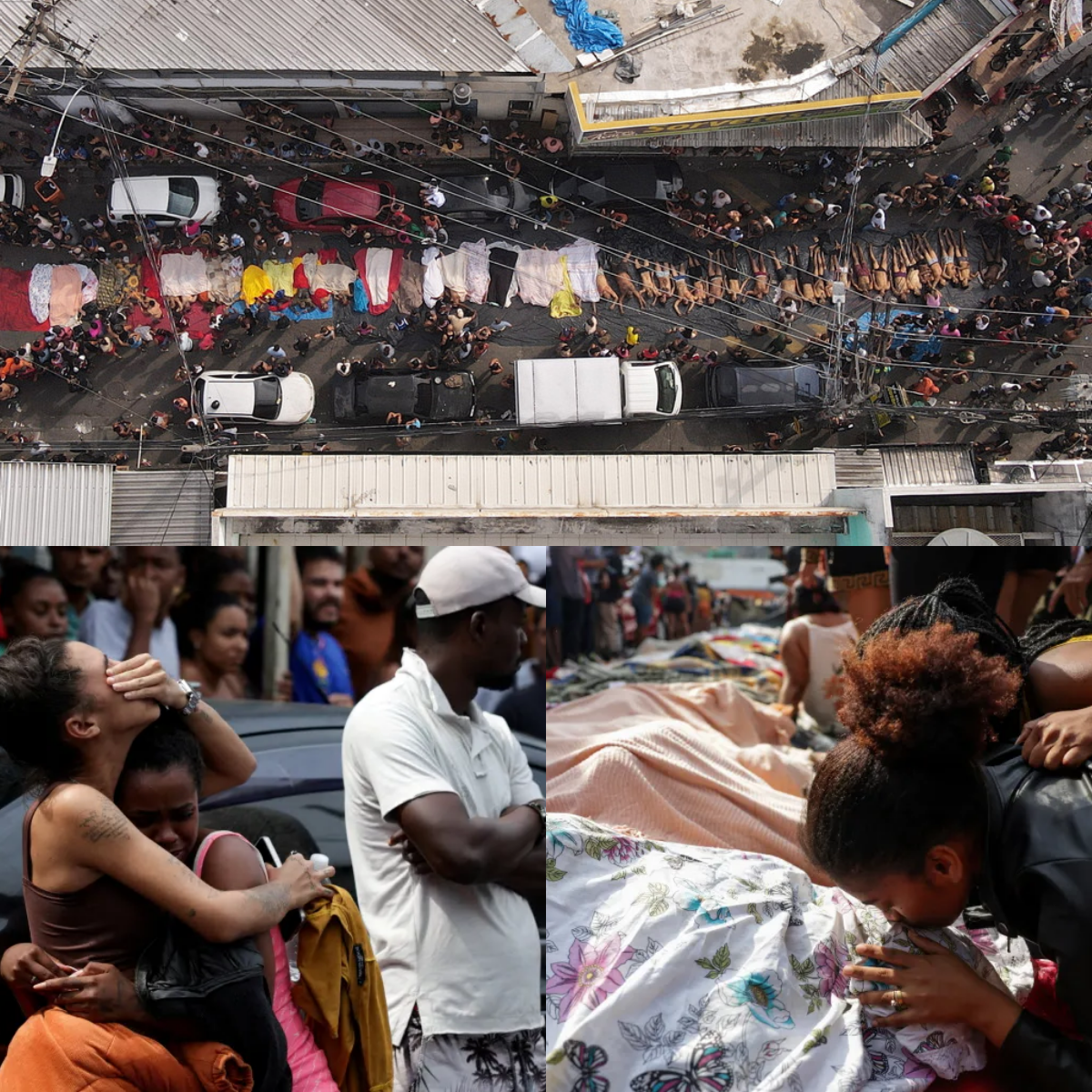The Night Rio Could Not Sleep
A city where tears have run dry — and grief walks in the streets
Rio de Janeiro did not sleep.
Not because of the neon lines along Avenida Brasil, or the restless hum of nightlife that usually clings to this city like salt from the ocean. No — last night, Rio stayed awake for a different light entirely:
The candles.
Thousands of them, trembling on narrow sidewalks and open doorways, flickering beside whispered names, soft sobs, and silent prayers.
It stayed awake for the voices — exhausted, trembling voices repeating the same fragile ritual, one name at a time.
Voices calling the d3ad home.
And in those voices lived a city that has cried so long, it has forgotten how to cry at all.
The Operation That Changed Everything
It was the largest police operation in Rio’s history — a sweeping surge through the favelas of Penha and Alemão, carried out under the banner of restoring order, dismantling criminal networks, reclaiming streets long surrendered to armed power.
Officials called it a milestone.
Residents called it a massacre.
And somewhere between those two truths lies a story soaked in gunpowder and silence.
More than 120 people d!ed, according to early reports — gang members, bystanders, mothers who were caught by stray bullets while boiling beans on Sunday stoves, boys who ran because they were trained since childhood that running sometimes saves your life.
Sometimes, it does not.

“We Had to Bring Them Back Ourselves”
In most places, the dead are gathered by authorities, by ambulances, by funerary teams trained for trauma.
But in Penha, the living became the last responders.
Residents — fathers, sisters, sons with shaking hands — walked into the brush and mud of the hills to retrieve bodies the way families retrieve lost children from rivers after storms. They lifted the fallen, wrapped them in sheets, carried them downhill while drones hummed above and reporters shouted questions no one could answer.
“They told us to wait,” one mother whispered, her shirt stained brown from dust and destiny.
“But he was lying there. He was getting cold. I could not leave him alone.”
There is a sound a body makes when it is set down carefully by someone who loves it — a soft, reverent thud, not the careless drop of violence but the surrender of grief.
Last night, that sound echoed in the alleyways like a heartbeat.
The Line of Silence
By evening, a line formed.
Not at bakeries, not at pharmacies, not at bus stops — but in front of a makeshift morgue arranged outside a local municipal gymnasium.
Mothers stood clutching ID cards.
Friends held photographs printed at corner kiosks.
Children sat on plastic chairs, legs too small to touch the ground, staring at shoes instead of faces.
Everyone waited to step forward, to point at a picture, or worse — to nod at a body lying under a sheet.
There are cities that do not scream, because screaming changes nothing.
There are cities that do not protest, because protest echoes only in valleys of guns and power.
There are cities that do not cry, because their tears have already emptied into the earth.
And then there is Rio — where people still whisper names, as if names could turn ghosts back into boys and neighbors again.
Last night, Rio whispered until its voice cracked.

What Really Happened?
Authorities say the operation targeted violent factions, that shootouts erupted, that every life lost was the price of crushing criminal dominion.
Residents tell a different story.
They speak of bullets without warning, of houses searched in the night, of questions answered by gunfire instead of words.
They speak of fear older than their walls, passed down like a family recipe no one wants to inherit.
They speak of being stuck between two empires — one with guns and badges, one with guns and cash — with no shield but the thin dignity of being human.
And in that thin space, between law and outlaw, between state and survival, ordinary people bled.
The Echo After the Gunfire
When the shots stopped, the stillness felt heavier than the battle.
No helicopters.
No shouting.
Just the quiet — a thick, suffocating blanket draped over narrow streets where echoes of boots still felt present in the dust.
People did what they have always done here:
They cleaned blood from stoops.
They boiled rice for children too young to understand war.
They lit candles on cinderblocks.
And they called out names to the night sky, hoping the wind carried their sound somewhere soft.
Beyond Numbers, Beyond Headlines
That is a number.
Numbers are easy to forget.
But names — names carve themselves into memory like initials etched on school desks.
Ricardo, 17.
Marcia, 42.
Lucas, who was learning to fix motorbikes.
Cristiano, who dreamed of moving his mother to the beach one day.
Ana, who never learned to fear as deeply as she should have.
In every favela in Rio, there is a generation raised by funerals, a generation who learned too young how to speak softly to grief.
They bury their friends in the afternoon and laugh with them in imagination at night.
They write tributes on concrete walls, then hope paint never fades.

A City With No More Tears?
No city can survive on fear alone.
And yet here, life persists — stubborn, brave, and unbearably fragile.
Tomorrow, boys will kick soccer balls between bullet holes.
Mothers will walk to markets.
Someone will sing from a window.
Someone will laugh louder than they should, because joy is rebellion in a place this tired.
But tonight, Rio does not sleep.
Tonight, it remembers.
Tonight, it names its dead, not in anger, not in vengeance, but in the oldest human ritual there is — bearing witness.
And somewhere in the darkness above Penha and Alemão, a city breathes in broken rhythm, holding together not through trust or peace, but through the quiet, relentless duty to love the ones who are gone.
What really happened inside Penha & Alemão?
Some will call it justice.
Some will call it war.
History will one day search for answers, for testimonies, for clarity in the smoke.
But last night, truth had no microphones — only candles, only names, only the footsteps of those carrying the dead as gently as if lifting them from sleep.
Rio stayed awake.
Not because of lights.
But because grief doesn’t close its eyes.
And because once you have cried the world empty, all you can do is whisper… and remember.



